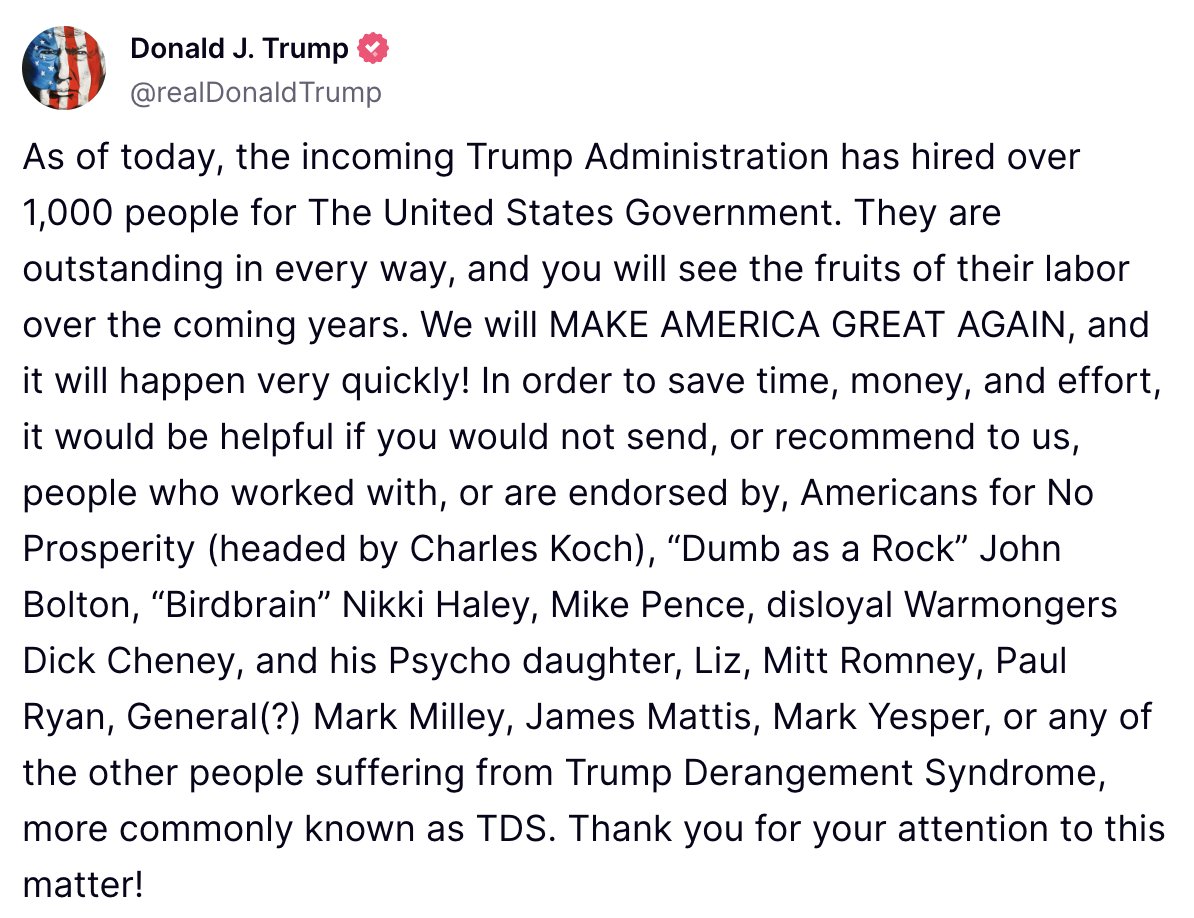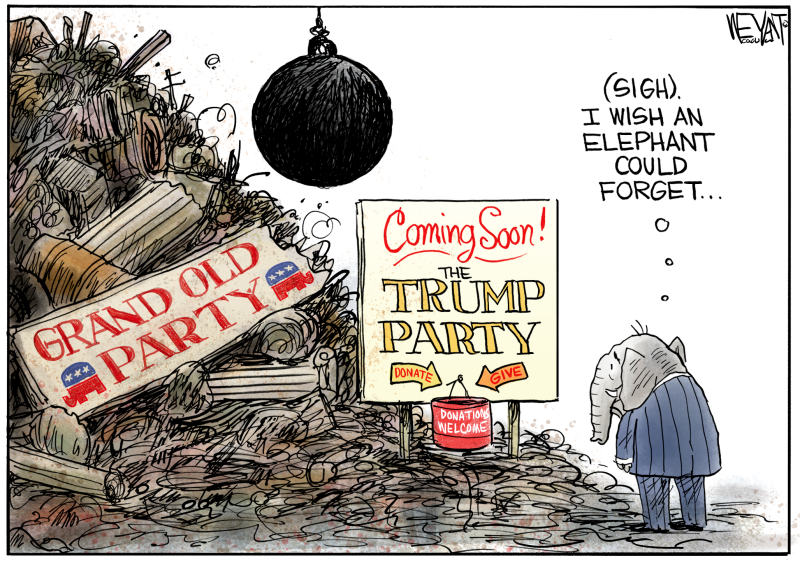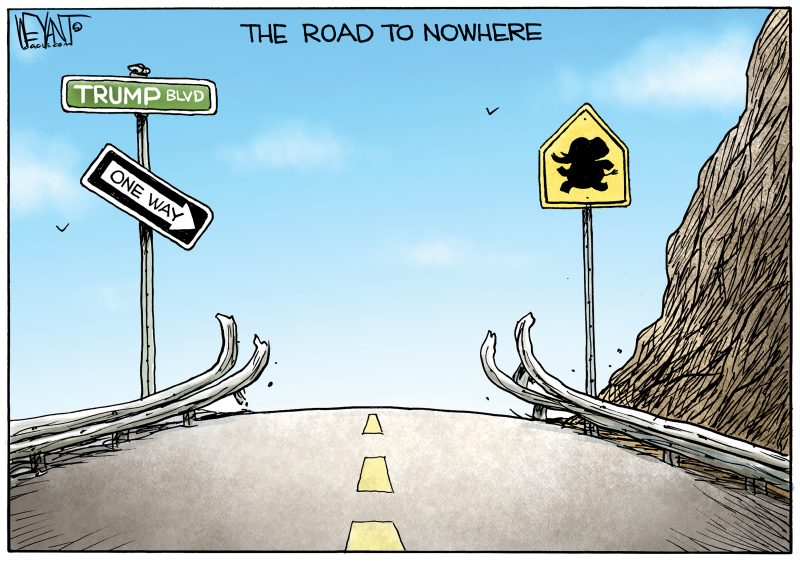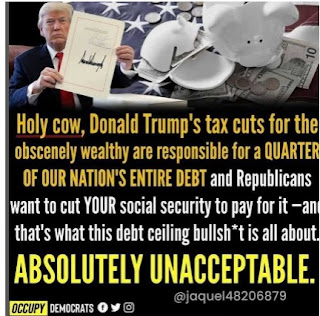Saturday, August 23, 2025
Thursday, January 16, 2025
Tuesday, December 24, 2024
Thursday, August 8, 2024
JD Vance’s selection as Trump’s running mate marks the end of Republican conservatism
Fascism and Christian Nationalism now define the GOP
Karyn Amira, College of Charleston
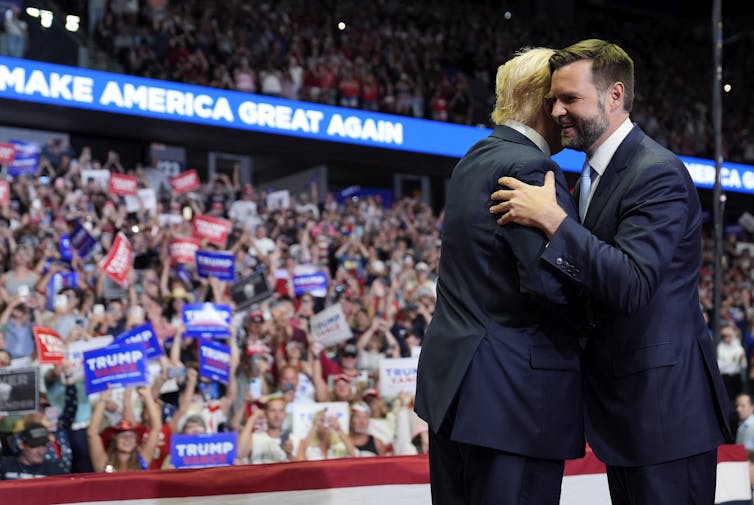 |
| Republican presidential candidate Donald Trump and vice presidential candidate JD Vance at a campaign rally in Michigan on July 20, 2024. AP Photo/Evan Vucci |
Given this dramatic change, what does Vance’s selection mean for the Republican Party and conservatism, the political philosophy that the GOP once claimed to embrace?
I am a political scientist whose research and political analysis focuses on the relationship between Trump, the Republican Party and conservatism. Everyday citizens define conservatism in different ways, but at its root it is a philosophy that supports smaller and less-centralized government because consolidated power could be used to silence political competition and deny citizens their liberties.
Since 2015, Trump has tightened his grip on the Republican Party, moving it further away from its professed conservative ideology. The choice of Vance as Trump’s running mate – and the competition that preceded it – are the latest steps in this process.
Vance came from a small pool of contenders that included other noteworthy politicians who likewise once vehemently opposed Trump. By examining their trajectories, we can see how the Republican Party has abandoned conservative values to serve a single man.
Saturday, June 29, 2024
Donald Trump ia a Profound Threat to Social Security, Medicare, and Seniors
How do we know? He's already told us—over and over and over again.
NANCY J. ALTMAN in Common Dreams
Donald Trump was the worst president for seniors in the history of the nation. That is not hyperbole. Alarmingly, if elected again, he will be even worse—and, worryingly, more effective.
When Trump ran for president in 2016, he claimed he would be the one
Republican not to cut our earned benefits but, when he actually became
president, every single one of
his budgets proposed deep cuts to Social Security and Medicare, as well as
Medicaid.
When Trump couldn’t get the cuts enacted, he employed the
old tactic of “starve the beast.” Figuring tax cuts are easier to enact than
benefit cuts, he cut income taxes which help to fund Medicare and Medicaid, and
sought to defund Social Security, which has its own dedicated revenue source.
To advance his goal of undermining Social Security,
Donald Trump grabbed the questionable power to go after its dedicated revenue
unilaterally—something without precedent. Because Trump was limited to
executive action, he was able to only defer the revenue, but he made clear that
he would not just defer the revenue, but eliminate it, if he were
re-elected. Insufficient dedicated revenue leads to automatic cuts.
Conveniently, automatic cuts means there is no one to clearly be held
accountable.
Trump’s goals to undermine these programs, so vital to seniors, have not changed. Trump continues to claim he won’t cut benefits despite his record to the contrary, but tells the truth from time to time. Moreover, he is reportedly considering, once again, defunding Social Security, if he has the chance. Trump also plans to continue to give his billionaire friends massive tax giveaways.
Friday, March 22, 2024
DO NOT let him do it again
Trump nearly derailed democracy once
Richard L. Abel, University of California, Los AngelesElections are the bedrock of democracy, essential for choosing representatives and holding them accountable.
The U.S. is a flawed democracy. The Electoral College and the Senate make voters in less populous states far more influential than those in the more populous: Wyoming residents have almost four times the voting power of Californians.
Ever since the Civil War, however, reforms have sought to remedy other flaws, ensuring that citizenship’s full benefits, including the right to vote, were provided to formerly enslaved people, women and Native Americans; establishing the constitutional standard of one person, one vote; and eliminating barriers to voting through the 1965 Voting Rights Act.
But the Supreme Court has, in recent years, narrowly construed the Voting Rights Act and limited courts’ ability to redress gerrymandering, the drawing of voting districts to ensure one party wins.
The 2020 election revealed even more disturbing threats to democracy. As I explain in my book, “How Autocrats Seek Power,” Donald Trump lost his reelection bid in 2020 but refused to accept the results. He tried every trick in the book – and then some – to alter the outcome of this bedrock exercise in democracy.
A recent New York Times story reports that when it comes to Trump’s time in office and his attempt to overturn the 2020 election, “voters often have a hazy recall of one of the most tumultuous periods in modern politics.” This, then, is a refresher about Trump’s handling of the election, both before and after Nov. 3, 2020.
Trump began with a classic autocrat’s strategy – casting doubt on elections in advance to lay the groundwork for challenging an unfavorable outcome.
Despite his efforts, Trump was unable to control or change the election results. And that was because of the work of others to stop him.
Here are four things Trump tried to do to flip the election in his favor – and examples of how he was stopped, both by individuals and democratic institutions.
Thursday, March 21, 2024
Only Trumpers are allowed to be Republicans
The Republican Party is going through a nasty divorce
By Kerry Eleveld for Daily Kos
When former Vice President Mike Pence said last Friday that he would not be endorsing his old boss Donald Trump for a second term as president, it made for a good chuckle: Pence wouldn't be backing the guy who tried to have him hanged on Jan. 6, 2021.
But
zoom out a bit and Pence's rejection of his former boss comes amid a
potentially meaningful groundswell of opposition from many of those who worked
closest with Trump—including his former top aides and Cabinet members.
The
Biden campaign sure thinks it’s notable. Shortly after Pence's statement, the
campaign's rapid response director, Ammar Moussa, blasted out a list to
reporters of former Trump staffers who don't think Trump and his autocratic
agenda should be "anywhere near the Oval Office."
Pence
topped the list, followed by former U.N. ambassador and Republican presidential
candidate Nikki Haley—but let's put a pin in that for a moment.
Other
former senior Trump officials who made Team Biden's "short list"
were:
- His Chief of Staff, Gen. John Kelly
- His National security Advisor, John Bolton
- His National Security Advisor, H.R. McMaster
- His Defense Secretary, Mark Esper
- His Defense Secretary, Gen. James Mattis
- His Attorney General, Bill Barr
- His Secretary of State, Rex Tillerson
Tuesday, March 5, 2024
Trump Republicans are committed to abandoning America’s historic embrace of democracy.
MAGA’s Plan to Steal the 2024 Election, Legally
THOM HARTMANN in ThomHartmann.Com
Back on March 13, 2020—almost exactly four years ago—I wrote an article that was published at alternet.org laying out how Republicans were then, 10 months before January 6, planning to partially repeat the debacle of the election of 1876 by having then-Vice President Mike Pence refuse to certify swing state votes and thus throw the election to the House to keep the-President Donald Trump in office, no matter how the election went.
When I published the article 10
months before January 6, I received concerned and even alarmed
communications from several Democratic strategists and a few elected officials
who basically said they didn’t think there was any way Trump would try such an
audacious move and, if he did, he wouldn’t get away with it.
But I was right and that was exactly what Trump had up
his sleeve. We saw it play out on January 6. The only thing that stopped him
was Pence’s unwillingness to go along with stealing an election.
Now I’m hearing a new story from those same GOP insiders
(as well as other commentators) about Trump’s schemes for 2024. Here’s what I’m
hearing Republicans are planning in the event Joe Biden wins re-election and
Democrats hold the Senate and take the House this November:
First, Republicans need to make sure they’re in control
of the House of Representatives on January 6, 2024, when the new president will
be certified.
To do that, even though Democrats might have won enough
seats to take back the House in the 2024 election, Speaker Mike Johnson will
refuse to swear into Congress on January 3 a handful of those Democrats,
claiming there are “irregularities” in their elections that must be first
investigated.
Friday, January 5, 2024
Jan. 6 insurrection was an example of networked incitement
Will Trump do it again this year - or has he already begun?
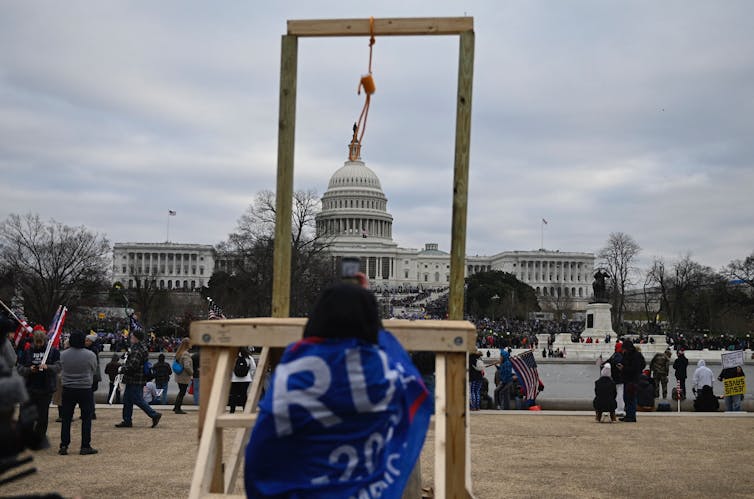 |
What set Jan. 6 apart was the defeated president of the United States using his cellphone to direct an attack on the Capitol, and those who stormed the Capitol being wired and ready for insurrection.
My co-authors and I, a media and disinformation scholar, call this networked incitement: influential figures inciting large-scale political violence via social media. Networked incitement involves insurgents communicating across multiple platforms to command and coordinate mobilized social movements in the moment of action.
The reason there was not more bloodshed on Jan. 6 emerged through investigation into the Oath Keepers, a vigilante organization composed mostly of former military and police. During their trials for seditious conspiracy, members of the Oath Keepers testified about weapons caches in hotels and vans, stashed near Washington, D.C. As one member described it, “I had not seen that many weapons in one location since I was in the military.”
Friday, November 3, 2023
With Shutdown Averted, Is Social Security Safe? Nope!
Taxing the rich is the best way to preserve Social Security and Medicare
JAMES ROOSEVELT JR., HENRY SCOTT WALLACE, JUNE HOPKINS, TOMLIN PERKINS COGGESHALL for Common Dreams
Let’s talk Social Security. The government shutdown was averted (temporarily), so that’s a good thing, right? Trump is promising not to touch it. Benefits are not threatened, right?
Wrong. Social Security has a bullseye on its back. As
descendants of the New Deal leaders who created it, we recognize the warning
signs, and need to shout the alarm.
The right-wing hard-liners who fired House Speaker Kevin
McCarthy—without a replacement in sight—are determined to balance the
budget by reducing spending. The word “revenues” is an obscenity to them. And
defense spending is sacred and untouchable.
But even if they completely eliminated every single
non-defense discretionary program—from food stamps to the FBI to border
protection—it wouldn’t be enough. It would add up to about $900 billion, or
about 15% of total
federal spending, which would fall far short of
balancing the budget. So their deficit-cutting zeal must inevitably turn to
what is called mandatory spending, most prominently the largest government
program of all, Social Security.
Republican presidential candidates are increasingly
emboldened to touch this deadly “third rail” of
American politics. Nikki Haley mocked other
candidates for promising not to touch Social Security. Ron
DeSantis wants to “revamp” it. Mike
Pence wants to privatize it, turning it over to
Wall Street and adding trillions to the national debt—to replace the New Deal with a
“better deal.”
And although former President Donald Trump now swears he would never harm a hair on Social Security’s head, his history renders such assurances hollow. He has previously suggested that a second Trump term would mean cuts to Social Security and Medicare.
Let’s not forget that his hugest unachieved social policy
goal at the end of his presidency was the complete termination of
Social Security’s principal funding source, the payroll tax.
Wednesday, October 11, 2023
Sunday, September 10, 2023
Governors may make good presidents
But not ‘imperial governors’ like DeSantis
Raymond Scheppach, University of Virginia
Many people believe governors make good presidents. In fact, a 2016 Gallup Poll found that almost 74% of people say that governing a state provides excellent or good preparation for someone to be an effective president. As a result, many political commentators have tried to explain why Florida Gov. Ron DeSantis is stumbling in his campaign for president. 
Nearly all are present or former governors. By Bill Day
Some say it is because he is stiff or awkward on the campaign trail, or his path to the nomination is not really to the political right of former President Donald Trump, or he needs to step up and directly confront the former president.
But as the former executive director of the National Governors Association for 27 years, I have worked with well over 300 governors. During that time I have been part of many conversations with governors regarding other governors running for president.
So I know that some current and former governors on both sides of the aisle would have another reason for why DeSantis is stalling. If you were to ask them, I expect they would mostly smile and say quietly, “It is because he has become an imperial governor” – one who believes he is all-powerful and that all his decisions will be just applauded and never questioned or opposed.
Monday, August 28, 2023
Thursday, August 24, 2023
Thursday, August 3, 2023
Criminal law expert explains new charge based on Trump's role in Jan. 6 insurrection
Using ‘dishonesty, fraud and deceit’ to cling to power
Gabriel J. Chin, University of California, Davis
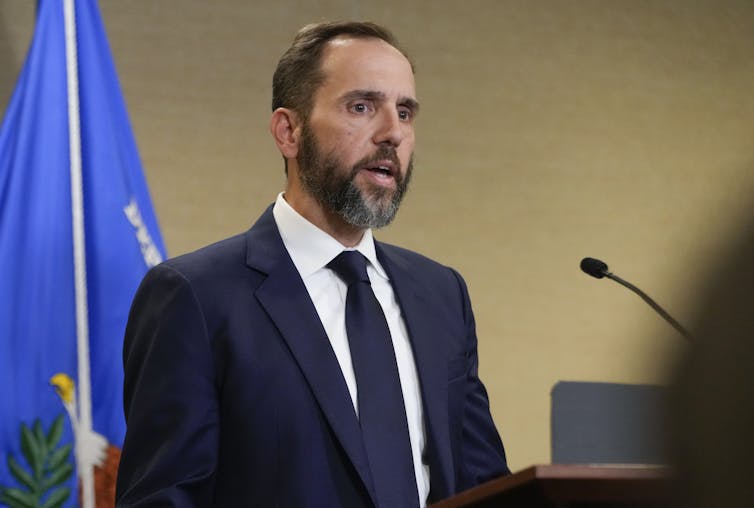 |
| Special Counsel Jack Smith announces the second federal indictment of Donald Trump on Aug. 1, 2023. AP Photo/Jacquelyn Martin |
It’s because these are the first federal charges alleging a former president effectively attempted a particular kind of coup, called an auto-coup, in which he attempted to keep himself in power by illegal means.
The indictment lists four felony charges. All of them rely on the same facts and boil down to the same set of five allegations, many of which have been previously reported.
All of the charges rest on the claim that Trump and his co-conspirators knew the former president lost the 2020 election, and that his claims of fraud and voting irregularity made before and on Jan. 6, 2021 were unfounded.
Three counts in this new indictment allege conspiracies: There is conspiracy to defraud the government; to obstruct an official proceeding – in this case, counting the electoral votes on Jan. 6, 2021; and against the rights of the voters to cast ballots and have them fairly and honestly counted.
The remaining count alleges obstruction of an official proceeding – namely, tallying the electoral vote. The document states that Trump allegedly had the help of six co-conspirators, including four lawyers, a Justice Department official and a political consultant.
None of them are charged in the indictment, and they are identified by number, not name. This could mean one or more of these people are cooperating with the Justice Department, but not necessarily.
The indictment charges that all of Trump’s many claims of election irregularities “were false, and the Defendant knew that they were false.”
I am a scholar of criminal law and procedure. While Trump is facing multiple other charges, this indictment contains the most serious charges he has faced thus far.
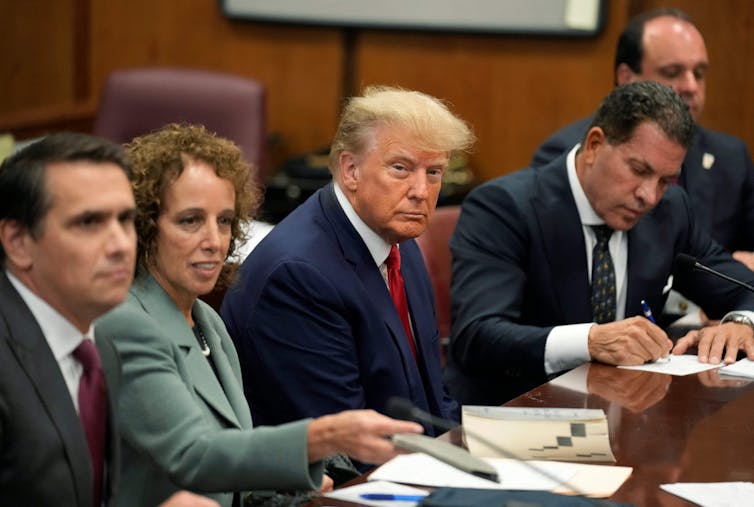 |
| Former President Donald Trump with his attorneys inside the courtroom during his arraignment at the Manhattan Criminal Court on April 4, 2023. Seth Wenig/POOL/AFP via Getty Images |
And the Justice Department has charged him in Florida with illegally keeping national security documents, but there is no allegation they were disclosed to foreign agents or represented much more than souvenirs.
This indictment, by contrast, alleges that Trump knowingly worked to hold on to an office he knew he was not entitled to.
Tuesday, June 13, 2023
What do the latest felony charges against Trump mean?
Criminal law scholar explains what the charges mean, and what prosecutors will now need to prove
Gabriel J. Chin, University of California, Davis |
| These are TRUMP'S own words on what should be done about Trump |
The 49-page document details how Trump kept classified government documents – including papers concerning U.S. nuclear capabilities – scattered in boxes across his home at his Mar-a-Lago resort in Florida, long after his presidency ended in 2021 and the government tried to reclaim them.
The indictment also shows that Trump shared classified national defense information with people without any security clearance, including someone on a political action committee.
There are 38 felony charges against Trump – 31 of these counts relate to withholding national defense information. Five counts relate to concealing possession of classified documents, and two relate to giving false statements.
“My office will seek a speedy trial in this matter, consistent with the public interest and the rights of the accused,” said U.S. special prosecutor Jack Smith, who was appointed to oversee the investigation into Trump’s holding of the documents.
The Conversation spoke to criminal law scholar Gabriel J. Chin at the University of California, Davis School of Law about the most important takeaways from the unsealed indictment – and the new, open questions it presents about Trump’s alleged criminal activity.
What is the significance of the Justice Department’s unsealing the indictment on June 9, ahead of Trump’s turning himself in to authorities?
In the federal system, indictments are not automatically sealed, and so either the U.S. special counsel did not request it to be sealed or a judge refused to seal it. I suspect it is more likely the former. This is not a case in which there are active components of the investigation still going on. The case was ready to go and there is no difference, from the government’s point of view, in disclosing the indictment today or not, because the case is in the can.
What stands out about the indictment?
One thing that really stood out was the extensive personal involvement of Donald Trump himself in this alleged activity. Normally, when a big company gets sued, the CEO doesn’t drop everything and start going through documents. That’s what various other professionals are for. The details of Trump’s alleged direct personal involvement in this case were striking.
Second, one of the challenges here is that prosecutors are trying to hold Trump responsible for an affidavit that a lawyer signed that included untrue statements that Trump did not have the documents the government was asking him to return. And to make that case stick, prosecutors will really have to show that Trump himself had some involvement with that.
 |
| Pages from the FBI’s redacted search warrant affidavit for Trump’s Mar-a-Lago estate are shown. Mario Tama/Getty Images |
Who are these other people? Is the government’s theory that Trump’s lawyers were innocent dupes and he fed them false information, or were they knowing participants in this criminality? No one else is named, but we are told – by that “others known and unknown” – that there definitely are others.
Why did the indictment focus on the movement of the boxes that held classified information at Mar-a-Lago?
The major reason is that all of the charges require some sort of intent. None of these charges would apply to someone who is trying to obey the law. Prosecutors have to show that what was going on here was an intentional, calculated act.
Another reason goes back to former Secretary of State Hillary Clinton , former Vice President Mike Pence and President Joe Biden, who have faced their own inquiries into possessing classified documents.
When former FBI Director James Comey said in 2016 that he wasn’t charging Clinton for using her personal email for government work, there were considerations that led him to do that.
People who make honest mistakes and cooperate in good faith don’t get charged because, first, it is difficult to make the case of wrongdoing. And there is some level of fairness to say that you don’t want to make public service a booby trap, where if you drop your guard for a second you could wind up in prison.
In this indictment, prosecutors are making an effort to tell the full story and explain why the actions detailed are wrongful. They appear to want to explain why the circumstances in this case justified charges and that this is not a “gotcha!” situation where someone has kept 200 cases of documents that have been carefully screened and one or two documents accidentally got in the mix.
What’s the significance of the many felony counts facing Trump?
Under the sentencing guidelines, which are usually followed, conviction on all counts could likely lead to a relatively short sentence or to no incarceration at all. However, it is important to note that in theory, Trump could be sentenced to the maximum on each count.
The sentence on all counts could be made to run consecutively, which would lead to a sentence in the neighborhood of 400 years. I do not think that would ever happen, but it does underscore the power of the judge in sentencing a case like this.![]()
Gabriel J. Chin, Edward L. Barrett Jr. Chair & Martin Luther King Jr. Professor of Law, University of California, Davis
This article is republished from The Conversation under a Creative Commons license. Read the original article.
Tuesday, May 23, 2023
It Is Now Democracy vs. Authoritarianism
ROBERT REICH in Robertreich.Substack.Com
The so-called "town hall" debacle marked the unofficial start of Donald Trump’s campaign to be reelected president of the United States.
He spent over an hour of prime-time television before an adoring crowd — courtesy of CNN — suggesting America should default on its debts (the crowd applauded) and that we should not defend Ukraine from Russia (cheers).
He defended his infamous “grab ’em by the pussy” comments, called E. Jean Carroll, against whom a Manhattan jury had just found him liable for sexual abuse and defamation, a “whack job,” and said her trial was “a rigged deal” (cheers and applause).
All of this was bad enough.
But what really got my attention was his attempt to rewrite the history of his attempted coup: He asserted that January 6, 2021, was “a beautiful day” (more cheers), that the Capitol rioters had “love in their heart,” and that if elected, he’d pardon those who have been convicted (big applause). He denied moderator Kaitlan Collins’s factual assertion that he took three hours to tell the January 6 rioters to go home (more cheers).
He claimed that he never asked Georgia election officials to “find” him the exact number of votes needed to defeat Biden in Georgia. (He did, and it’s on tape.)
And he reiterated that the 2020 election was stolen from him, and — menacingly — refused to commit to the results of the 2024 presidential election (more applause).
What’s been the reaction to this prime-time squalor?
No Republican lawmaker has condemned it — except for Utah’s Mitt Romney (remember him? He was the Republican Party’s presidential nominee in 2012, as amazing as that now seems).
From the rest of the Republican Party — Speaker Kevin McCarthy, Senate Minority Leader Mitch McConnell, other Republican leaders in Congress, Republican governors? Nothing.
Friday, March 17, 2023
Thursday, March 9, 2023
Let's Be Clear: Social Security Is Not Adding a Penny to US Debt
All those charts and narratives ascribing Social Security the top spender of federal monies need debunking.
FREDERIC H. DECKER
for Common Dreams
The narrative that Social Security eats up government revenue, driving the federal debt upward, is deeply entrenched in the Republican Party’s psyche.
Former-Vice President Mike Pence insinuated such
February during a private meeting with business leaders when promoting the
age-old Republican wish to privatize Social Security. So maybe Social Security
won’t be off the table, as GOP leaders earlier promised, as the
current debate over the debt ceiling unfolds.
 |
| The easiest way to make sure Social Security is fully funded is to end the cap on taxed income. |
Consequently, debunking the myth Social
Security feeds the debt seems an inherent requirement in gaining support for
progressive proposals to reform
Social Security. That, in addition to outlining how cutting benefits unduly
inflicts harm within the aging population.
Now consider all those misleading charts. Those charts showing Social Security the top spender of federal monies surely don’t help foster favorable public opinion or keep the GOP benefit-cutting hatchet in the sheath.
Nor do stories like that February 9 on PBS Newshour when a segment on Medicare and Social Security closed with this on the screen: "Almost a third of federal spending this fiscal year is expected to go toward Medicare and Social Security."
PBS Newshour (which I support and watch regularly) is not alone, of course; the spending attributed to Social Security and other social programs is a recurrent theme during this debt-ceiling news cycle.
Even the Treasury Department on one website has, at
the time of this writing, a bar chart with
Social Security the top bar consuming 19 percent of all spending.
Busting the debt myth
can start with a report from the
Government Accountability Office where stated how for years the Social Security
program “built up reserves” from revenue collected that “were invested in federal
government securities, reducing the amount that must be borrowed from the
public,” including from other countries, to cover federal deficits. (By law
surplus funds in Social Security have to be invested in government securities.)

